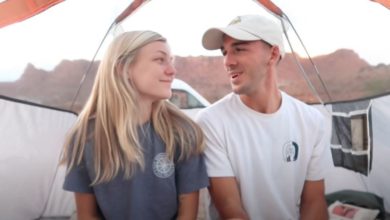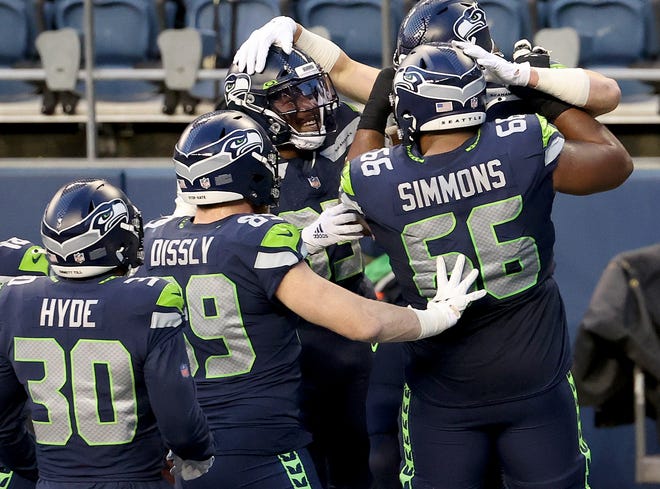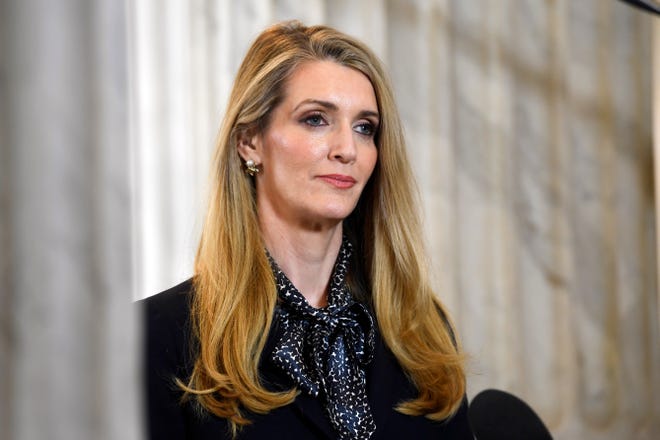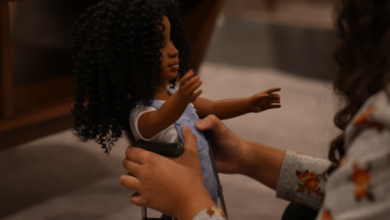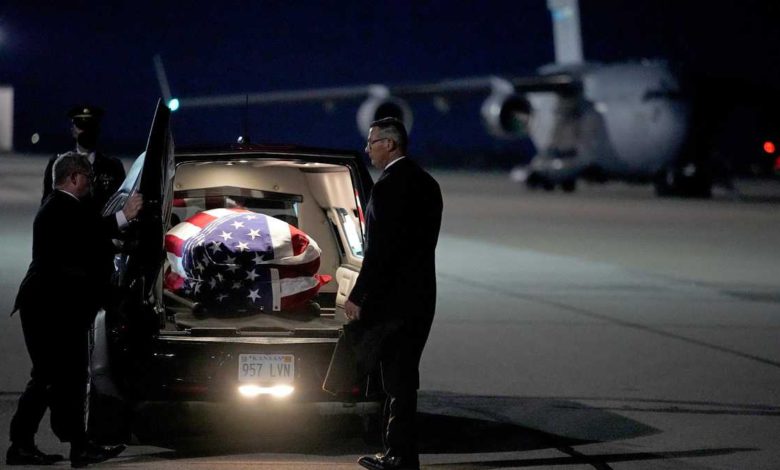

Bob Dole was remembered in his western Kansas hometown on Saturday as a compassionate patriot, shaped by small-town values and a tough prairie landscape to become "the greatest of the Greatest Generation.”Dole made his last journey to his home state for a memorial service in Russell, so that fellow Kansans could honor the military service during World War II that left him severely wounded and the distinguished political career that followed his recovery. The day's events began with a public viewing of his casket and a memorial service at a Roman Catholic church in Russell, the small town some 240 miles west of Kansas City where he grew up during the Great Depression.Another memorial was to follow Saturday afternoon in the state capital of Topeka, where Dole briefly served in the Kansas House in the 1950s. The dignitaries at both events included Democratic Gov. Laura Kelly; Kansas' two Republican U.S. senators, Roger Marshall and Jerry Moran, and former GOP U.S. Sens. Pat Roberts and Nancy Kassebaum Baker.Dole died Sunday at the age of 98 after serving nearly 36 years in Congress and running as the GOP nominee for president in 1996. U.S. Senate Minority Leader Mitch McConnell, who served more than a decade with Dole in the Senate and later surpassed Dole as the longest-serving GOP leader there, attended the event in Russell.Kelly said in remarks in Dole's hometown that Russell was “where his roots run deepest.” Dignitaries in dark, formal business attire mixed in the congregation with local residents dressed in less formal farm and work clothes.“As we gather here today to come together to salute our state’s most favorite of favorite sons and the greatest of the Greatest Generation, we pause to reflect with immense gratitude on all that Bob Dole's life meant to Kansas and to Kansans, to our nation and to the world,” Kelly said.Dole — known for a caustic wit that he sometimes turned on himself — also was honored Friday during a service at Washington National Cathedral. President Joe Biden was among the speakers there. Another tribute followed at the World War II Memorial in Washington — a monument to Dole’s generation that he worked to get built.Dole became known as a congressional leader who could bridge partisan divides to pass legislation such as the landmark Americans with Disabilities Act aimed at preventing discrimination against the disabled. Moran attributed that ability to Dole's ties to a small town, where, he said, people who disagree on politics still must mix in their daily lives.“And if we fought among ourselves all the time, like sometimes national politics exhibits today, our towns would be a thing of the past,” Moran said, occasionally choking up during his remarks.Dole will be buried in Arlington National Cemetery, but his casket was flown Friday evening to Salina, Kansas, then transported 70 miles west to his boyhood hometown, which now has about 4,400 residents.Oil production allowed Russell to boom when Dole was growing up, even during the Great Depression, with the first local well drilled in 1923, the year he was born. Moran quoted Dole's speech accepting the 1996 presidential nomination, in which Dole said, "the first thing you learn on the prairie is the relative size of a man compared to the lay of the land.”“His family and this community endured the Dust Bowl of the Great Depression,” Moran said. “In Russell, you could feel and see the challenges, the obstacles, the barriers that were put in people’s lives. Nothing was easy.”
Bob Dole was remembered in his western Kansas hometown on Saturday as a compassionate patriot, shaped by small-town values and a tough prairie landscape to become "the greatest of the Greatest Generation.”
Dole made his last journey to his home state for a memorial service in Russell, so that fellow Kansans could honor the military service during World War II that left him severely wounded and the distinguished political career that followed his recovery. The day's events began with a public viewing of his casket and a memorial service at a Roman Catholic church in Russell, the small town some 240 miles west of Kansas City where he grew up during the Great Depression.
Another memorial was to follow Saturday afternoon in the state capital of Topeka, where Dole briefly served in the Kansas House in the 1950s. The dignitaries at both events included Democratic Gov. Laura Kelly; Kansas' two Republican U.S. senators, Roger Marshall and Jerry Moran, and former GOP U.S. Sens. Pat Roberts and Nancy Kassebaum Baker.
Dole died Sunday at the age of 98 after serving nearly 36 years in Congress and running as the GOP nominee for president in 1996. U.S. Senate Minority Leader Mitch McConnell, who served more than a decade with Dole in the Senate and later surpassed Dole as the longest-serving GOP leader there, attended the event in Russell.
Kelly said in remarks in Dole's hometown that Russell was “where his roots run deepest.” Dignitaries in dark, formal business attire mixed in the congregation with local residents dressed in less formal farm and work clothes.
“As we gather here today to come together to salute our state’s most favorite of favorite sons and the greatest of the Greatest Generation, we pause to reflect with immense gratitude on all that Bob Dole's life meant to Kansas and to Kansans, to our nation and to the world,” Kelly said.
Dole — known for a caustic wit that he sometimes turned on himself — also was honored Friday during a service at Washington National Cathedral. President Joe Biden was among the speakers there. Another tribute followed at the World War II Memorial in Washington — a monument to Dole’s generation that he worked to get built.
Dole became known as a congressional leader who could bridge partisan divides to pass legislation such as the landmark Americans with Disabilities Act aimed at preventing discrimination against the disabled. Moran attributed that ability to Dole's ties to a small town, where, he said, people who disagree on politics still must mix in their daily lives.
“And if we fought among ourselves all the time, like sometimes national politics exhibits today, our towns would be a thing of the past,” Moran said, occasionally choking up during his remarks.
Dole will be buried in Arlington National Cemetery, but his casket was flown Friday evening to Salina, Kansas, then transported 70 miles west to his boyhood hometown, which now has about 4,400 residents.
Oil production allowed Russell to boom when Dole was growing up, even during the Great Depression, with the first local well drilled in 1923, the year he was born. Moran quoted Dole's speech accepting the 1996 presidential nomination, in which Dole said, "the first thing you learn on the prairie is the relative size of a man compared to the lay of the land.”
“His family and this community endured the Dust Bowl of the Great Depression,” Moran said. “In Russell, you could feel and see the challenges, the obstacles, the barriers that were put in people’s lives. Nothing was easy.”
Source link

